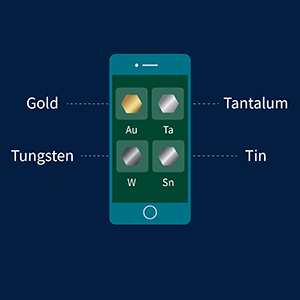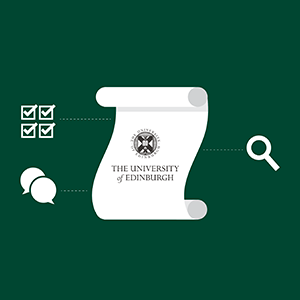Conflict minerals

Conflict minerals are mined in conflict zones and used by armed groups to fund violence and wars.
The most well-known case of conflict minerals is in the Democratic Republic of Congo and the surrounding Great Lakes Region of Sub-Saharan Africa, but there are many other areas around the world.
The most well-known conflict minerals are often referred to as the ‘3Ts and gold’ – Tin, Tungsten, Tantalum and Gold – but can also include copper, cobalt, platinum and diamonds. These minerals are found in a range of everyday products including electronics.
Once mined, the minerals are shipped mainly to Asia, where they’re processed for use in electronics and other products. Tantalum is used to produce capacitors used in high-performance electronics, including GPS, mobile phones and computers. Tin is used for solder on the circuit boards of electronic equipment and Tungsten is used to make vibration mechanisms in electronic devices.

The two biggest problems surrounding conflict minerals are the human rights abuses suffered by the miners and the lack of traceability of these minerals.
In 2015, it was thought that more than 50% of mines in eastern Congo are under the control of armed groups.1 These groups often use violence to control local communities and force people to work in the mines, where they are often subjected to human rights abuses such as child labour, 48-hour shifts and dangerous working conditions.
Once mined, these minerals are smuggled out of the Congo to neighbouring countries, including Uganda and Rwanda, and then shipped mainly to Asia. The armed groups make money by taxing and selling the minerals to smugglers, and this money may be used to buy more weapons and ammunition in order to maintain control of their territories, continuing the cycle of violence.
In Asia, at the smelters, the conflict minerals are processed down and mixed with minerals from other countries. This makes it difficult to trace minerals from conflict zones. The minerals are then used in the manufacturing of electronics components as well as products and exported across the world. However, avoiding minerals from Congo is not the best option, as the Congolese miners have very limited livelihood opportunities. Therefore, establishing conflict-free mines and conflict-free smelters is considered a good way to combat the situation.
1 IPIS Research: A three-year study on artisanal mining in eastern DR Congo – 2015 update
What can I do?
University staff who want to purchase electronics goods should consider the risk that their purchases might contain conflict minerals.
- Purchase goods via a centrally approved channel or supply contract. Check SciQuest(secured).
- Think about what you are buying. Avoid buying new electronics if they aren’t needed, and research electronics manufacturers’ positions on conflict minerals when you do need to purchase new electronics.
- Contact companies to see what they are doing to eradicate conflict minerals from their supply chain.
- Reach out to charities and organisations that are working to raise awareness and eradicate conflict minerals. For example, Conflict-free Campus Initiative [external].
If you’d like more support or advice, please contact us.
What is the University doing?
We are committed to working towards eradicating Conflict Minerals from the goods bought by the University.
We do this by:
- investigating suppliers’ efforts to combat conflict minerals
- requesting evidence of any actions and outcomes
- working collaboratively with procurement consortia and the wider public sector
- developing academic research that may help inform purchasing options (for example, the Make ICT Fair project)
This multi-faceted strategy is part of the University’s Living Lab approach to problem-solving, aiming to further the institution’s knowledge and action in the area of conflict minerals. Findings and best practices are shared with other institutions.
Conflict Minerals Policy

The policy builds on Sustainable Procurement work and founding membership of Electronics Watch, an EU-wide initiative that supports public buyers in calling for fair working conditions in electronics manufacturing.
Procurement is responsible for striving to ensure large purchases of electronics goods do not contain conflict minerals, while the Department for Social Responsibility and Sustainability is working to encourage further research and raise awareness amongst smaller-scale purchasers.
Our Conflict Minerals Policy has been amended in October 2017 to explicitly recognise the risk of conflict minerals in other commodities beyond ICT, such as in construction and vehicles. Originally passed on 1 March 2016 by the University’s Central Management Group.





Recent comments